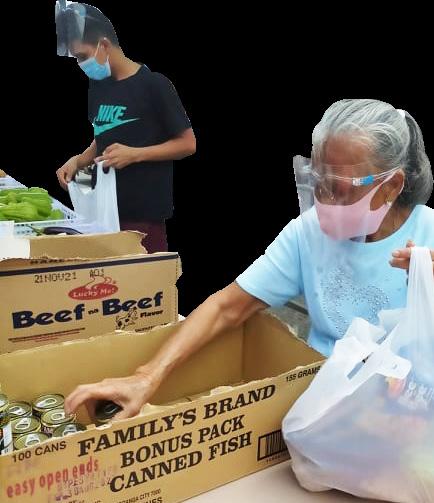
3 minute read
‘Red-tagging not an issue’: UNC groups launch community pantries
UNC groups launch community pantries
Advertisement
SARAH CARINAN
TO LEND A helping hand in this time of hunger and hardships, the University of Nueva Caceres (UNC) Senior High School (SHS), Institutionalized Community Extension Services (ICES), and the UNC Engineering and Architecture College Council (EACC), along with the UNC College of Engineering and Architecture (EA), launched their community pantries at different areas in Camarines Sur.
According to SHS Assistant Principal for Student Affairs Melinda Susana Dy, the purpose of the initiative, which was conducted last May 26, was “to extend help to the indigent residents of Barangay Sta. Cruz.” She also added that more or less 250 individuals benefited from the community pantry.
The goods that were given include vegetables, canned goods, noodles, rice, and health kits such as alcohol, face shields, and soap which were donated by the SHS faculty, students, and private donors. “The donations came from the SHS Leadership, Principal, Assistant Principal, Learning Supervisors (LSs), Learning
Facilitators (LFs), from their friends, their relatives, and from SHS students,” Dy stated.
Moreover, the EACC shares the same intent with UNC SHS stating that setting up a community pantry allowed them to help and spark up the Bayanihan spirit among UNCeans at this time of the pandemic.
“The Engineering and Architecture College Council along with the EA department decided to set up a community pantry simply because we saw an opportunity to help. The project will give us a chance to help the UNC Community in our small little ways. Initiating it will also foster camaraderie among the Unceans and build up the spirit of sharing with others,” EACC said.
They also added that the accumulated donations and support from 30 individuals and organizations were safely given to several beneficiaries who lined up at the location where the sharing table stands.
“The estimated number of individuals who were able to benefit from the community pantry is 60 to 80,” EACC added.
Despite the threats of red-tagging and possible profiling of individuals and organizations involved in this community effort, the UNC SHS and EACC continued the distribution of free food and goods to those who are in need with pure intentions and no worries.
“With all honesty, red-tagging would never be an issue to us. The project aimed to help people who are part of the UNC family. Most donors were also Unceans who were most willing to share. We were able to sustain [it] for 10 days, not including the other days where food was served,” EACC said. The community pantries began on April 14, when a 26-yearold small business owner Ana Patricia
Non set up a small bamboo cart along
Maginhawa Street in Quezon City filled with canned goods, fresh vegetables, packs of rice, and noodles, vitamins, and other necessities amid the pandemic. A handwritten cardboard sign was attached to the cart that reads “Maginhawa Community Pantry” and came with the slogan, “Magbigay ayon sa kakayahan, kumuha batay sa pangangailangan.” This initiative was then spread across the country and had drawn the attention not just of the public but also of the anti-terrorism forces. Days after the initiative started, police officers arrived at the location to get Non’s personal information including her political affiliations. This certain action of the police created the red-tagging scare among the public. Despite this, the community pantries that have been put up in hundreds of localities continue to provide free goods to those people who were greatly affected by the pandemic.
SHARE AND CARE. The UNC Institutionalized Community Extension Service (ICES) set up a community pantry at Gawad Kalinga Abangayon, Pamukid, San Fernando last June 5 to help its indigent residents. This is one of the many pantries launched by various University organizations. Photo by UNC ICES and words by Sharline Berjuega

Photo by UNC SHS










